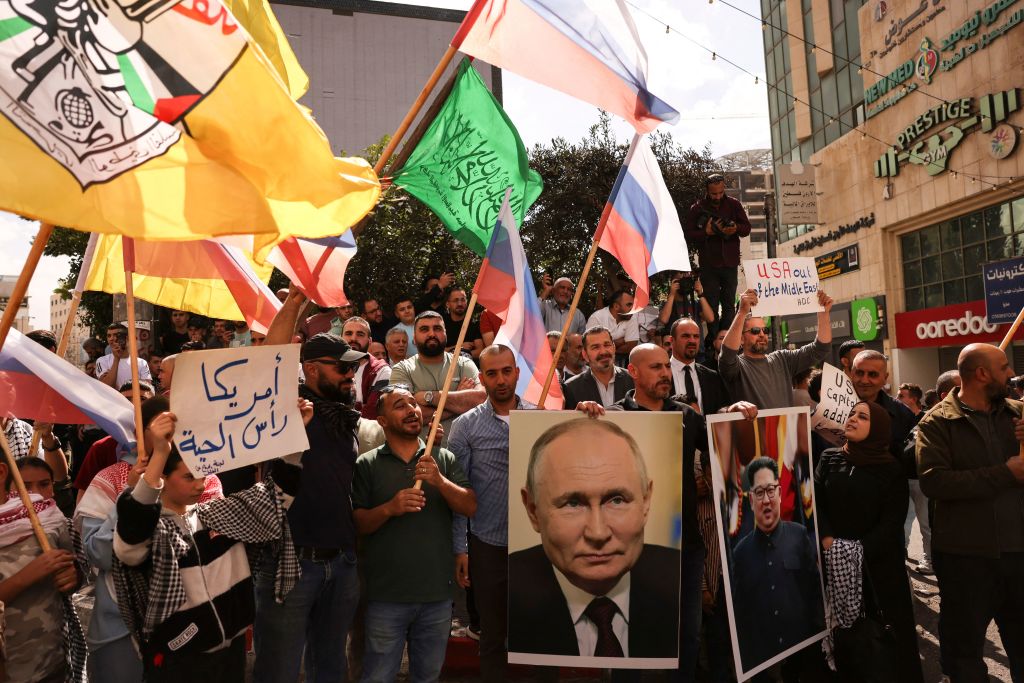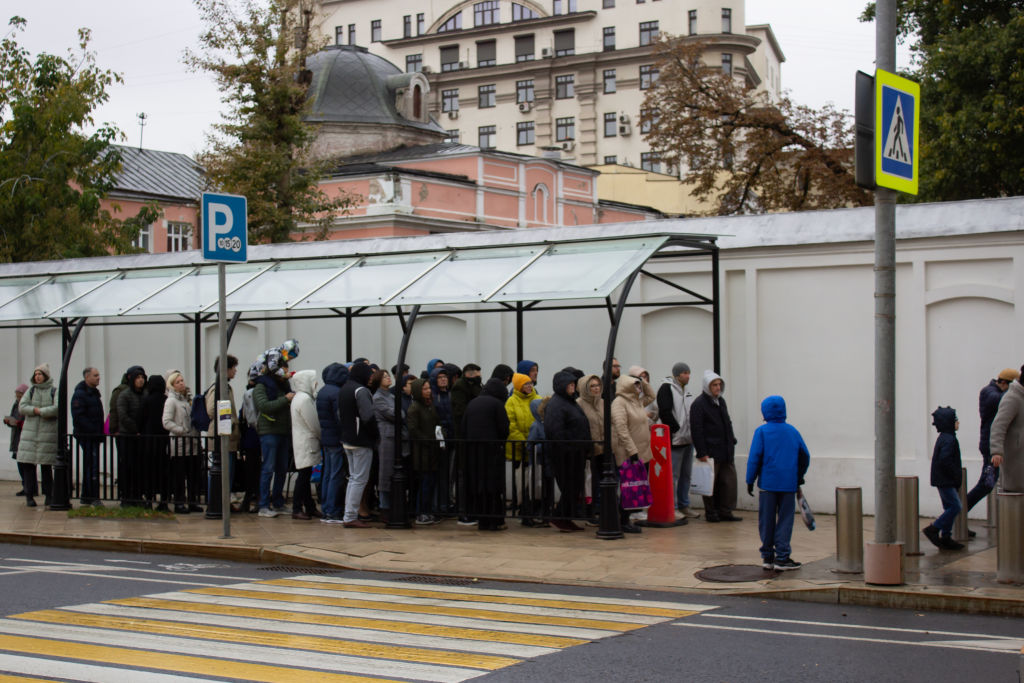
Israeli President Benjamin Netanyahu used to call Russia’s president, Vladimir Putin, his “dear friend.” Since 2015, the Israeli leader has visited Russia more than 10 times, and proudly hung a giant poster of the two presidents shaking hands over his party headquarters during an election campaign in 2019. But the relationship between Russia and Israel has cooled following Russia’s full-scale invasion of Ukraine, even if Israel has remained more reluctant to support Ukraine than its Western allies would have liked.
Even so, it came as a shock to many in Israel to see a group of high-ranking Hamas members meeting with a senior Russian official on Oct. 26. The Israeli Foreign Ministry slammed the decision to invite Hamas members to Moscow as “an act in support of terrorism” and called for Russia to expel the Hamas delegation.
Tense relationships between Russia and Israel have only become more frayed following a riot in Dagestan, in southern Russia, on Oct. 29. Hundreds of rioters stormed an airport to search for Israelis arriving on a flight from Tel Aviv. Israel has condemned the mob and asked Moscow to protect Israeli citizens and Jews in Russia.
Read More: What to Know About the Attacks on U.S. Military Bases in the Middle East
In the wake of Hamas’s attacks on Oct. 7, which killed over 1,400 Israelis, experts say Russian officials have tried to toe a difficult line. While Russia has been quick to criticize Israel’s strikes on Gaza, it remains reluctant to sever ties with Israel altogether. As the Israel-Hamas conflict shows little sign of slowing down, Russia may also be hoping that support for Ukraine will be placed on the back burner for the U.S. and its allies.
Here’s what to know about Russia’s relationship with Hamas, and what experts say Russia stands to gain from the rising tensions in the Middle East.
Russia’s Strategic Moves in the Aftermath of Hamas’s Attack
Russia has defended its decision to host Hamas members in Moscow, saying it is important to maintain ties with both sides in the Israel-Hamas conflict. The Russian Foreign Ministry said in a statement that the meetings were part of Russia’s efforts to secure the release of hostages from Gaza.
But Hamas’s description of the meetings paints a different picture. The group praised Russia’s efforts to end what it called “the crimes of Israel that are supported by the West,” according to Russia’s state-owned RIA news agency. In the wake of the meetings, Hamas has announced that it is looking for eight hostages in Gaza that Russia has asked to be released, “because we look at Russia as our closest friend,” Hamas Politburo member Abu Marzouk said on Oct. 28.
Hamas’s visit to Moscow adds to Israeli fears that Russia is readjusting its foreign policy to move closer to Hamas. Palestinian militants have reportedly gotten around Western sanctions by funneling millions through Russian cryptocurrency exchanges. Ukraine’s Head of Defense Intelligence Kyrylo Budanov has also said that Russia has recently supplied Hamas with arms, although he did not provide evidence for his claim. There is no evidence that Russia was involved in instigating Hamas’s Oct. 7 attacks or supplied weapons used.
But Russia has notably not condemned Hamas’s attacks on Oct. 7 as terrorism. Instead, Russian officials have called for both sides to put down arms and reaffirmed its support for a Palestinian state. At the United Nations Security Council, a Russian resolution that called for a ceasefire and the release of all hostages was voted down as it failed to condemn Hamas.
Read More: Inside Volodymyr Zelensky’s Struggle to Keep Ukraine in the Fight
In speeches and public appearances, Russian officials have repeatedly criticized Israel’s treatment of Palestinians. Russian Foreign Minister Sergei Lavrov said on Oct. 28 that Israel’s bombardment of Gaza is against international law. Putin compared Israel’s blockade of Gaza to Nazi Germany’s siege of Leningrad during World War II, one of the most traumatic events in Russian history during which hundreds of thousands of Russian civilians died.
Others in Russia have gone further, arguing that it is time for Russia to reassess its relationship with Israel. “Whose ally is Israel? The United States of America,” Andrei Gurulev, State Duma deputy and member of its Defense Committee, wrote on Telegram. “Whose ally is Iran and its surrounding Muslim world? Ours.”

In the court of public opinion, “Russia has taken a pro-Palestinian position to an extent that even I was surprised by it,” says Hanna Notte, an expert in Russia’s foreign policy in the Middle East at the James Martin Center for Nonproliferation Studies.
“They’re trying to align themselves with the Arab mainstream” as a bid to improve Russia’s standing in the region, says Mark Katz, a professor at George Mason University..
For Hamidreza Azizi, an expert in Iran-Russia relations at the German Institute for International and Security Affairs, Russia’s response to Hamas’s attacks also reflects an inclination towards a closer relationship with Tehran and its allies in the region, which include Hamas. Iran, Israel’s bitter enemy, has become one of Russia's key weapons suppliers for its war in Ukraine.
“I think Russia has made a strategic choice already on who to side with in the Middle East, and it’s not Israel,” says Azizi.
How Russia Stands to Gain from Unrest in the Middle East
So far, Russia may believe that it can profit from the Israel-Hamas conflict, experts say.
While Russian forces remain bogged down in intense fighting along the front in Ukraine, Kremlin propagandists have rejoiced in the hope that the unrest in the Middle East will divert Western support from Ukraine, making it easier for Russia to consolidate its territorial control over parts of Ukraine. “The distraction value from the war in Ukraine is relevant in terms of media attention as well as potentially weapons support over the medium term,” says Notte.
Read More: The Harrowing Work Facing Gaza Doctors in Wartime
The Pentagon has reportedly decided to send Israel tens of thousands of 155mm artillery shells that were originally planned for Ukraine, according to Axios. In addition to artillery ammunition, already in scant supply across Western countries, both Israel and Ukraine need several of the same weapons systems. So far, Pentagon officials have insisted that they will be able to support Ukraine and Israel at the same time. “We can do both, and we will do both,” Defense Secretary Lloyd Austin said at a press conference in Brussels on Oct. 11.
Even so, Russia also faces risks if the conflict spreads beyond Israel and Gaza. Notably, Russia wants to preserve its military presence in Syria without sending in more troops, which would increase pressure on the already hard-pressed Russian forces, analysts say.
If Russia increases its support for Hamas beyond words, it would likely come at the cost of worsening relationships with Israel. Russia has been grateful to Israel for not sending military support to Ukraine, and the two countries maintain contact over military operations in Syria, Katz says.
Even so, Russia has time and time again managed to maintain difficult balancing acts in the Middle East, and may be able to do so once more, winning Arab support without cutting ties with Israel, Notte says.
“I still think that there are more signs that somehow there will still be a sort of modus vivendi between Israel and Russia,” says Notte. “But it also depends on how things play out further down the line in this conflict.”
More Must-Reads From TIME
- The 100 Most Influential People of 2024
- Coco Gauff Is Playing for Herself Now
- Scenes From Pro-Palestinian Encampments Across U.S. Universities
- 6 Compliments That Land Every Time
- If You're Dating Right Now , You're Brave: Column
- The AI That Could Heal a Divided Internet
- Fallout Is a Brilliant Model for the Future of Video Game Adaptations
- Want Weekly Recs on What to Watch, Read, and More? Sign Up for Worth Your Time
Contact us at letters@time.com